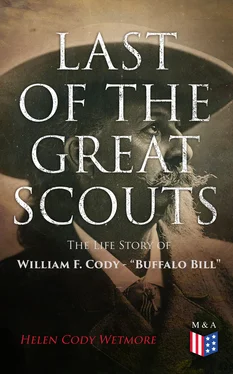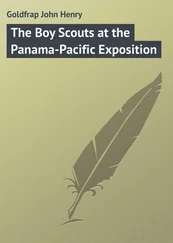To follow the creek and river to Fort Kearny was not accounted much of a chance for escape, but it was the only avenue that lay open; so, with a parting volley to deceive the besiegers into thinking that the fort was still held, the perilous and difficult journey was begun.
The Indians quickly penetrated the ruse, and another charge had to be repulsed. Besides the tiresome work of wading, there were wounded men to help along, and a ceaseless watch to keep against another rush of the reds. It was a trying ordeal for a man, doubly so for a boy like Will; but he was encouraged to coolness and endurance by a few words from Frank McCarthy, who remarked, admiringly, "Well, Billy, you didn't scare worth a cent."
After a few miles of wading the little party issued out upon the Platte River. By this time the wounded men were so exhausted that a halt was called to improvise a raft. On this the sufferers were placed, and three or four men detailed to shove it before them. In consideration of his youth, Will was urged to get upon the raft, but he declined, saying that he was not wounded, and that if the stream got too deep for him to wade, he could swim. This was more than some of the men could do, and they, too, had to be assisted over the deep places.
Thus wore the long and weary hours away, and though the men, who knew how hard a trip it was, often asked, "How goes it, Billy?" he uttered no word of complaint.
But half a day's wading, without rest or food, gradually weighted his heels, and little by little he lagged behind his companions. The moon came out and silvered tree and river, but the silent, plodding band had no eyes for the glory of the landscape.
Will had fallen behind some twenty rods, but in a moment fatigue was forgotten, the blood jumped in his veins, for just ahead of him the moonlight fell upon the feathered head-dress of an Indian chief, who was peering over the bank. Motionless, he watched the head, shoulders, and body of the brave come into view. The Indian supposed the entire party ahead, and Will made no move until the savage bent his bow.
Then he realized, with a thumping heart, that death must come to one of his comrades or the Indian.
Even in direst necessity it is a fearful thing to deliberately take a human life, but Will had no time for hesitation. There was a shot, and the Indian rolled down the bank into the river.
His expiring yell was answered by others. The reds were not far away. Frank McCarthy, missing Will, stationed guards, and ran back to look for him. He found the lad hauling the dead warrior ashore, and seizing his hand, cried out: "Well done, my boy; you've killed your first Indian, and done it like a man!"
Will wanted to stop and bury the body, but being assured that it was not only an uncustomary courtesy, but in this case quite impossible, he hastened on. As they came up with the waiting group McCarthy called out:
"Pards, little Billy has killed his first redskin!"
The announcement was greeted with cheers, which grated on Will's ears, for his heart was sick, and the cheers seemed strangely out of place.
Little time, however, was afforded for sentiment of any sort. Enraged at the death of their scout, the Indians made a final charge, which was repulsed, like the others, and after this Bill McCarthy took the lead, with Frank at the rear, to prevent further straggling of the forces.
It was a haggard-faced band that came up to Fort Kearny with the dawn. The wounded men were left at the post, while the others returned to the wrecked bull-train under escort of a body of troops. They hoped to make some salvage, but the cattle had either been driven away or had joined one of the numerous herds of buffalo; the wagons and their freight had been burned, and there was nothing to do but bury the three pickets, whose scalped and mutilated bodies were stretched where they had fallen.
Then the troops and trainmen parted company, the former to undertake a bootless quest for the red marauders, the latter to return to Leavenworth, their occupation gone. The government held itself responsible for the depredations of its wards, and the loss of the wagons and cattle was assumed at Washington.
CHAPTER VI. — FAMILY DEFENDER AND HOUSEHOLD TEASE.
Table of Contents
THE fame to which Byron woke one historic morning was no more unexpected to him than that which now greeted Will. The trainmen had not been over-modest in their accounts of his pluck; and when a newspaper reporter lent the magic of his imagination to the plain narrative, it became quite a story, headed in display type, "The Boy Indian Slayer."
But Will was speedily concerned with other than his own affairs, for as soon as his position with the freighters was assured, mother engaged a lawyer to fight the claim against our estate. This legal light was John C. Douglass, then unknown, unhonored, and unsung, but talented and enterprising notwithstanding. He had just settled in Leavenworth, and he could scarcely have found a better case with which to storm the heights of fame—the dead father, the sick mother, the helpless children, and relentless persecution, in one scale; in the other, an eleven-year-old boy doing a man's work to earn the money needed to combat the family's enemies. Douglass put his whole strength into the case.
He knew as well as we that our cause was weak; it hung by a single thread—a missing witness, Mr. Barnhart. This man had acted as bookkeeper when the bills were paid, but he had been sent away, and the prosecution—or persecution—had thus far succeeded in keeping his where-abouts a secret. To every place where he was likely to be Lawyer Douglass had written; but we were as much in the dark as ever when the morning for the trial of the suit arrived.
The case had excited much interest, and the court-room was crowded, many persons having been drawn thither by a curiosity to look upon "The Boy Indian Slayer." There was a cheerful unanimity of opinion upon the utter hopelessness of the Cody side of the case. Not only were prominent and wealthy men arrayed against us, but our young and inexperienced lawyer faced the heaviest legal guns of the Leavenworth bar. Our only witnesses were a frail woman and a girl of eighteen, though by their side, with his head held high, was the family protector, our brave young brother. Against us were might and malignity; upon our side, right and the high courage with which Christianity steels the soul of a believer. Mother had faith that the invisible forces of the universe were fighting for our cause.
She and Martha swore to the fact that all the bills had been settled; and after the opposition had rested its case, Lawyer Douglass arose for the defense. His was a magnificent plea for the rights of the widow and the orphan, and was conceded to be one of the finest speeches ever heard in a Kansas court-room; but though all were moved by our counsel's eloquence—some unto tears by the pathos of it—though the justice of our cause was freely admitted throughout the court-room, our best friends feared the verdict.
But the climax was as stunning to our enemies as it was unexpected. As Lawyer Douglass finished his last ringing period, the missing witness, Mr. Barnhart, hurried into the court-room. He had started for Leavenworth upon the first intimation that his presence there was needed, and had reached it just in time. He took the stand, swore to his certain knowledge that the bills in question had been paid, and the jury, without leaving their seats, returned a verdict for the defense.
Then rose cheer upon cheer, as our friends crowded about us and offered their congratulations. Our home was saved, and Lawyer Douglass had won a reputation for eloquence and sterling worth that stood undimmed through all his long and prosperous career.
The next ripple on the current of our lives was sister Martha's wedding day. Possessed of remarkable beauty, she had become a belle, and as young ladies were scarce in Kansas at that time, she was the toast of all our country round. But her choice had fallen on a man unworthy of her. Of his antecedents we knew nothing; of his present life little more, save that he was fair in appearance and seemingly prosperous. In the sanction of the union Will stood aloof. Joined to a native intuition were the sharpened faculties of a lad that lived beyond his years. Almost unerring in his insight, he disliked the object of our sister's choice so thoroughly that he refused to be a witness of the nuptials. This dislike we attributed to jealousy, as brother and sister worshiped each other, but the sequel proved a sad corroboration of his views.
Читать дальше












